Peshmerga have never sold weapons from the Bundeswehr by Enno Lenze
It is irresponsible, unscrupulous journalism to claim that an army fighting on the front lines against Islamic State terrorists is illegally selling German weapons at a bazaar. This calls into question the continued supply, in this case, of weapons that are actually essential for survival.
The NDR, the WDR, the Tagesthemen and the Deutsche Welle spread several times that the Kurdish Peshmerga would not be able to control the whereabouts of German weapons. All other media wrote off there. At the same time, the German journalists could not provide any evidence for their claims. They did not respond to reproaches because “those down there” could not be believed anyway. I have been doing research on and off for five years now and present the facts here.
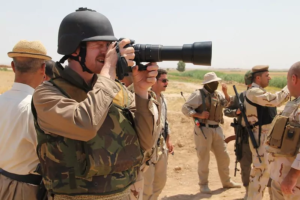
When the terrorist militia “Islamic State” attacked the Iraqi city of Mosul from June 4 to 10, 2014, taking control of it and robbing the banks, the Kurds in Iraq found themselves just an hour’s drive east of this city – without international help. It was happening to the Kurds in northern Iraq just as it had happened to the Kurds in Syria before. In Syria, the Kurdish People’s Liberation Units (YPG) had been fighting the Islamic State for months without outside help. IS chief Abu Bakr al-Baghdadi then proclaiming the caliphate in Mosul on June 29, 2014. I was in his former premises and those of his security service in January 2020.
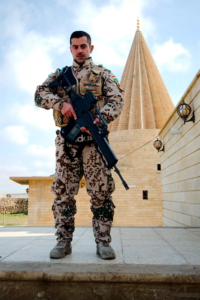
According to the Iraqi constitution, the autonomous region of Kurdistan in northern Iraq has its own government and security forces. The border with the central government in Baghdad is theoretically clearly defined, but in practice it is flexible. There are majority Kurdish-inhabited areas under central Iraqi control, which are called “disputed areas”. IS was in these disputed areas, but not yet in Kurdistan-Iraq.
Since formally all arms purchases by the Kurds must go through the central government in Baghdad, but Baghdad does not approve the purchases, the Kurds are de facto cut off from the legal international arms market. To this day, they do not want to participate in illegal activities and live with the problem. Allies are few. Initially, the Turkish army quickly and easily supplied weapons, ammunition and trainers. Among the weapons supplied were German weapons, which the Turkish army has been buying for decades. The Turkish army also has weapons of foreign armies, which it captured from the PKK in Turkey and YPG in Syria, which in turn had captured them from other armies. When finding such a weapon, it is almost impossible to determine the exact route as well as the (il-)legality.
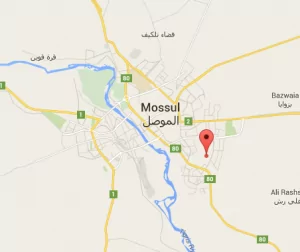
2014 – Fighting without usable weapons
I was already on the ground in June 2014 and, while researching the war that was just beginning, reached the last suburb of Mosul that had not yet been occupied. It quickly became clear that the lack of weapons had dramatic consequences. The Mosul Dam, which lies north of the city, had already been taken by IS on the western side, while the eastern side was held by the Peshmerga, the army of the Autonomous Region of Kurdistan, and in part by Iraqi forces at the time. The strategically and economically important dam is located at the end of a huge reservoir.
The Peshmerga had hardly any bulletproof vests and almost no helmets at all, and had a hodgepodge of often old AK-47 Kalashnikov assault rifles, Soviet Dragunov sniper rifles, or even M4 and M16 assault rifles left behind by the Americans in various wars. All proven and reliable weapons. But none that were of any use at this dam. When the Peshmerga tried to take the dam, the IS would fire from the other side with old, large-calibre Russian DSchK machine guns. These can easily penetrate armoured vehicles. So, it only took two fighters and a heavy machine gun behind a thick steel plate to hold the causeway, but it would have taken a rocket launcher or air strike on the other side to take out that tiny “position.”
The problem of IS’s “mad-max cars” was similar. This refers to improvised armoured bombs on wheels – a car with armour plates on the outside and explosives on the inside. With this, a suicide bomber simply drove into a Peshmerga position and then detonated the explosive device. Without an anti-tank weapon, it was impossible to stop such a driving suicide bomb. A very trivial, yet at that moment, unsolvable problem. And there were hundreds more of this kind.
In June 2014, I met the commander of an anti-terrorist unit, who explained the problem to me in detail. When I returned in January 2015, I visited his grave. A Mad-Max car was coming through the desert toward his base. He immediately jumped into a pickup truck, drove toward the car, and rammed it, causing it to explode. He saved the lives of dozens through his efforts – and left behind his wife and three young children.
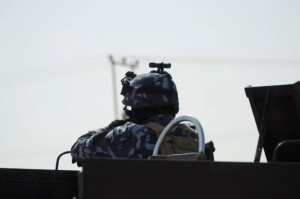
The first military support
The Turkish weapons were followed by those of the Americans, who also brought trainers and troops into the country, but expected political quid pro quos in return. Israel had already brought its Peshmerga army trainers to the country and increased its commitment. China initially offered aid in exchange for mineral resources, but then withdrew its offer. Talks with the German government dragged on but proceeded quickly by German standards. The German government still supplied a number of weapons in 2014. Most notably, the G36 assault rifle and the MILAN anti-tank weapon (“rocket launcher”) with night vision targeting optics. With precisely this rocket launcher, one could now fight Mad-Max cars and similar attacks and no longer had to give one’s life for that of one’s comrades. With this knowledge, it is little wonder that new-borns in Kurdistan were called “Milan”, “Angela” or “Ursula”. The German chancellor and the defense minister at the time were considered heroes here. From the Kurds’ point of view, strong women who ruled a country and an army in Europe and who had understood how important the fight against the terrorist Islamic State was. I spoke to both of them at the time, both of them were honestly concerned about avoiding more orphans. Because those come from a lack of certain weapons at certain moments combined with an adversary who has set out to do nothing less than annihilate all dissenters.
At that time, the discussion also arose as to whether or not the G36 would work reliably in the desert. I had seen the German weapons on the ground and talked to the Peshmerga who used them. I also tested identical weapons in the desert myself to get an idea of the situation. They worked well if you used the weapons with the right ammunition and in the right way. I was surprised how many of the journalist colleagues in Germany broke the story with the jamming without subjecting it to a fact check. On the other hand, I was attacked for doing just that. You have to be a “gun nut” or a “weapons nut” to do that. I see it differently: I like to check facts. No more, no less. I would otherwise never take a G36 in my hand, it impresses me little technically.
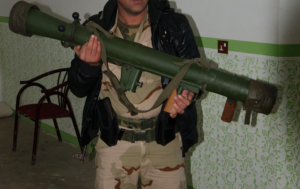
“Peshmerga sell German weapons at the bazaar”.
After the German weapons had been delivered, distributed and the users had been instructed in them, I wanted to travel to Kurdistan again to see the whole thing in practice. While I was there, an article was published in Germany saying that the Peshmerga were selling the weapons they had just received from the Bundeswehr directly back at the bazaar. The press release said “(…) according to the research, Peshmerga fighters are selling their service weapons because they have not received pay for months due to the tense economic situation in the country. (…) G3 assault rifles, built in 1986, are offered on the markets at a price of 1450 to 1800 US dollars. (…) an end-use control thus seems to be impossible for the federal government.”
Deutsche Welle reported on January 21, 2016: “The governor of Kirkuk province, Najmeddin Karim, confirmed that the Kurdish government is unable to pay state employees – including Peshmerga fighters – on a regular basis due to a lack of financial resources.”
A few lines that hit Germany like a bomb. All the newspapers and news programs pounced on it. Really everyone reported it exactly the same way. So, can we assume that all these media had two independent sources for this story and possibly did a fact check themselves, as required by professional ethics?
It was to take me five years, more than a hundred interviews, thousands of pages of study of documents, and several trips to the region to unravel the whole story. To say one thing up front: I can’t confirm it by standard journalistic standards.
I was in Kurdistan at the exact time and had doubts about the story because it seemed illogical at its core. The Peshmerga were relatively alone in facing a ruthless and overpowering enemy. After tough negotiations, they received few weapons from the federal government. Why should they sell them post-haste – and to whom? The consequences are clear to all people here in Kurdistan that the illegal sale of these weapons would have resulted in the immediate stop of further deliveries. At that time, news from the front, from the rest of the world, simply about everything, was constantly running in all cafes, at home and in many stores in Kurdistan. Ordinary people on the street were often surprisingly well informed about details of German weapons and refugee policy. And they wanted to preserve and protect their country. Even in 2014, amusement parks, shopping malls and cafes everywhere were open as normal. People went to work, earned money, went to clubs to party. There were and are car dealers from Jaguar to Kia. It may be that many Germans have a bizarre image of Kurdistan in their minds, but the country is just as well supplied with fast mobile Internet, even in the outlying areas. The people are just like those in Europe. Many have been to Germany or other European countries. You don’t live behind the moon in Kurdistan.

First, I contacted some German journalists from the major newspapers as well as the public media, asked them for their sources and explained that I had a different impression on the ground and would like to get to the bottom of the matter of the allegedly sold weapons. All the feedback was sobering. Most of the articles were based on “research by colleagues” – meaning reading and summarizing other people’s articles. In school, this was still called copying. There was no research of one’s own or even a fact check. Nor was there a second source. Often it was said that there were two sources, because two reporters had written the original and often copied the article together. Thus, there were two sources. A very interesting interpretation of these rules. It was also exciting that U.S. colleagues didn’t want to pinch the story. I checked with some major media outlets. They all said it was a single source that could not be verified. “No better than a tweet with no other links,” one CNN colleague called it.
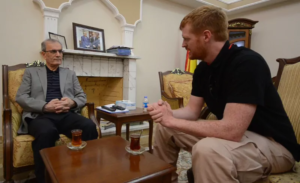
So, I contacted the Kurdish authorities and also the quoted governor, whose first name is Najmaldin and not Nadschmeddin. He said he knew nothing about a conversation with these journalists. He then immediately issued a press release saying: “The governor ‘categorically’ rejects the DW report as false”. A journalistic total loss. The quoter of Deutsche Welle let know in black and white that the German public broadcaster is lying.
It went on to say, “The investigation was conducted by two German broadcasters, NDR and WDR, who visited Kurdish arms markets that had German rifles on display. The report does not cite any Peshmerga or arms dealers who claim to have sold newly supplied German weapons.”
I confronted Deutsche Welle about this and the fact that they misspelled his name. The governor is a surgeon by profession. Dr. Najmaldin Karim was in charge of the emergency room when U.S. President Ronald Reagan was admitted after his attempted assassination. He is a U.S. citizen. Therefore, you don’t have to transcribe his name, just copy it from his passport. There is no interpretation there. Deutsche Welle’s answer was terse: “Articles about this appeared in a similar way in other media: Welt, Focus, N-TV, FAZ. In all these articles one of the O-Ton donors is a Najmeddin Karim – in exactly this spelling. Should Mr. Najmaldin/Nadschmeddin not want to be quoted in this way after such a long time, he is welcome to contact us.” To date, the DW article has not been corrected. Dr. Najmaldin Karim will not get back to us. He has since passed away.
In order to resolve this story correctly, even in terms of its content, and to explain that the governor had explained the facts correctly at the time, one must know that the salary of the Peshmerga is paid – or should be paid – by the Iraqi central government in Baghdad. But if you are a journalist, and you don’t know the context, and you don’t ask, you come to a distorting, wrong conclusion. It seems as if the Kurdish government had not paid the Kurdish Peshmerga soldiers a salary and therefore they had to turn the German weapons into money.
A second accusation in the article is that it is impossible to verify the whereabouts of the weapons. When I was on the ground, I immediately asked the Kurdish regional government if I could check this. It took a few hours, then I was told where in Erbil I could see the complete list of weapons and the assignment to units. Only records or a reproduction of the list were not allowed, because there were only a few MILAN, and they did not want to give the IS any information where the rocket launchers were in use.
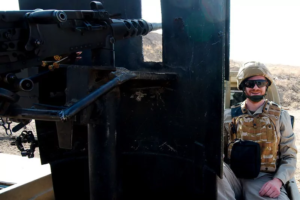
Under fire
Since paper is patient, I wanted to see these systems in practice. I was allowed to do that as well. Since we had to get very close to the area conquered by IS for this purpose, I was provided with a protected convoy that took me by the fastest route to places I had selected. Among them was the contested area around the town of Shingal.
There we saw a battle in which a silo building was fired upon by the Islamic State, which IS was supposed to have defeated here. Silos can cause a tremendous explosion. We ourselves were shelled shortly after on a serpentine road. My convoy could not get out of the way. There was no forward and no back. In this situation, a Peshmerga position further up the mountain saved us with a rocket launcher. As it turned out, it was a MILAN system. I could perceive the missile’s guidance wire uncoiling. So that was how I had seen the use of the ground-to-ground anti-tank guided missile – albeit differently than I had imagined. Of course, not only I took advantage of this offer, but at other times also other journalists like Claas Weinmann and Tobias Huch. All of them were able to see the systems in action. German security forces also repeatedly inspected individual Peshmerga positions. People in the German government don’t like to talk about it, but they like to read their reports. I met a vehicle of these “inspectors” by chance when I was in a frontline section in 2015.
Later, some newspapers also reported that the MILAN system had been “given away” by the Kurdish Peshmerga to the YPG in Syria. There were two “evidence pictures.” One showed a MILAN system in Kobane, Syria, and the other showed a MILAN system in an unknown location, deployed by YPG forces. The first photo was very easy to explain: The Peshmerga received permission from the Turkish government to travel from Kurdistan-Iraq through Turkey to Syria to help the YPG defeat the Islamic State. This was a historically unique moment that does not fit into any of the clichés of Turkish-Kurdish relations. This mission was coordinated and approved with all parties involved.
The other photo is just as simple, if different, to explain: The MILAN system at the YPG has what looks like a dark, large light bulb on top. This is the cooling cartridge for the night vision targeting optics. It is not reusable, but it is almost silent. There is a second version with a compressor, about the size and square shape of a milk carton. This one is reusable and makes noise. During development, there was no agreement on which solution was better, and so there were two parallel systems. The disposable cartridge is used in the French system, which France also sold to the Syrian army, from which the YPG captured it. The reusable compressor is used in the German version, which was supplied to the Peshmerga. This “expertise” can be gleaned from the Wikipedia page on the MILAN system.
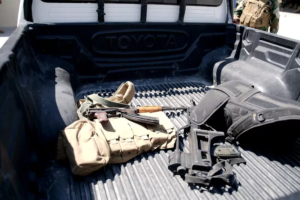
The core of the story, however, is the sale of Bundeswehr weapons from the current delivery by Peshmerga to third parties. This is also a criminal offense in Kurdistan-Iraq. So, in 2016, I asked the authorities about the state of affairs. The police in the regional capital of Erbil immediately told me that the investigation was being conducted by the Asayhes. This is a mixture of an investigative agency and an intelligence service. Asayhes employees told me quite openly about the status of the investigation and asked whether I had the documents of the German government on this matter. After all, there had been investigations of their own and a meeting in the defense committee, at which representatives of the Kurdish regional government were supposed to have been present. The result there, it was said from circles of the security authorities, was: “We have found nothing that points to a sale of the weapons by the Peshmerga.”
What is known, they said, is the loss of four weapons: Three G36 assault rifles and one a P1 pistol. First, the question arises: is the story even relevant? Four weapons in an area, which has been riddled with one war after another for centuries? It has no relevance to a war. Is it unique? Neither is it. The U.S. is missing 700,000 weapons – in words, seven hundred thousand – in Afghanistan and Iraq alone. That means that in those countries, 1% of the population could have a U.S. weapon.
The Bundeswehr has also regularly lost weapons, some have been stolen and some have been sold. There are criminals everywhere.
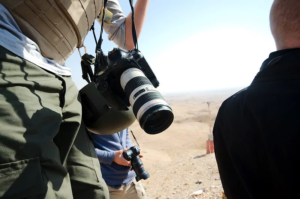
Of the four weapons lost, the whereabouts of all of them are known: The three G36s were destroyed in an attack on a Peshmerga post in Kirkuk. Seven Peshmerga died as a result. The weapon parts were later recovered and documented, and the photos were handed over to the German authorities. A P1 pistol was correctly reported by a Peshmerga as lost in action. It actually turned up at a market, but was never sold, instead being confiscated. The licensed arms dealer was able to correctly document the purchase of the weapon. He had not bought it from a Kurdish soldier, but from a Syrian Arab who had to flee from IS and leave his homeland. He, in turn, stated on record that he had found the weapon – in the region where it had been reported lost in action some time before. At the time of its loss, fighting was going on there; it was found when the area was liberated from IS.
A G3 assault rifle also appears in some reports, said to have been offered by a Peshmerga. Again, the Kurdish authorities know the seller and the weapon. The seller was never Peshmerga, he is also a licensed arms dealer, and he too was able to provide correct proof of purchase. The weapon does not originate from the delivery of the Bundeswehr, but from a neighbouring country, which is known to me, but which I cannot name due to factual-political constraints. However, the exact route of the weapon could not be traced. The Turkish army has repeatedly received weapons from Bundeswehr and ex-NVA stocks. Both Turkey and Iran produce the G3 under license.
The police in Erbil, as well as Asayesh as well as the Peshmerga Ministry explained to me that they received apart from my inquiry still no further from Germany. So, no one else has been interested in a fact check.
Again, I asked colleagues why they had not done this fact check. The answer was often frighteningly racist: “HAHAHA! You can’t believe a word they say anyway!” There are certainly government agencies that can’t be trusted much. For example, if you asked about the opposition in the GDR, or if you asked about human rights in North Korea. But what is the data basis for distrusting the Kurdish-Iraqi authorities? When asked, none. It’s more a feeling that you just can’t trust “them” down there. “You could never really trust the Iraqis,” the Middle East expert of a major magazine told me. Just to lump “Iraqis” and Kurds together speaks volumes. The Iraqi army was still gassing Kurds and burying them alive in the 1980s. 2017 was the last time the armies faced each other on the domestic border. Difficult to see these parties as the same, then as department heads.
International cooperation, like any relationship between people, is based primarily on trust. In 2018, when Ali B., a child murderer from Germany, tried to abscond to Kurdistan-Iraq, all checkpoints, domestic military checkpoints, on major roads were immediately informed. It took less than 48 hours for Kurdish authorities to capture him and put him on a Lufthansa plane to Frankfurt. That sounds rather like they are very reliable partners.
So, what remains of the headline? Instead of “Peshmerga sold Bundeswehr weapons” it should read “A soldier’s weapon lost in action was confiscated at a market by a dealer who had acquired it correctly according to the applicable standards.” But that doesn’t sound so lurid.
All photos were provided by ©Enno Lenze.
Enno Lenze is a blogger and managing partner of the publisher „Berlin Story“. Born in Bochum, he grew up in Rwanda and later made himself again and again a picture of crisis regions. Lenze is also familiar with digital topics and advised companies in IT and marketing matters in an international consulting firm.
He is also a supporter of the pirate movement and accredited for Pirate Parties International (PPI) at the United Nations Office of Geneva as part of the ECOSOC membership as an observer.
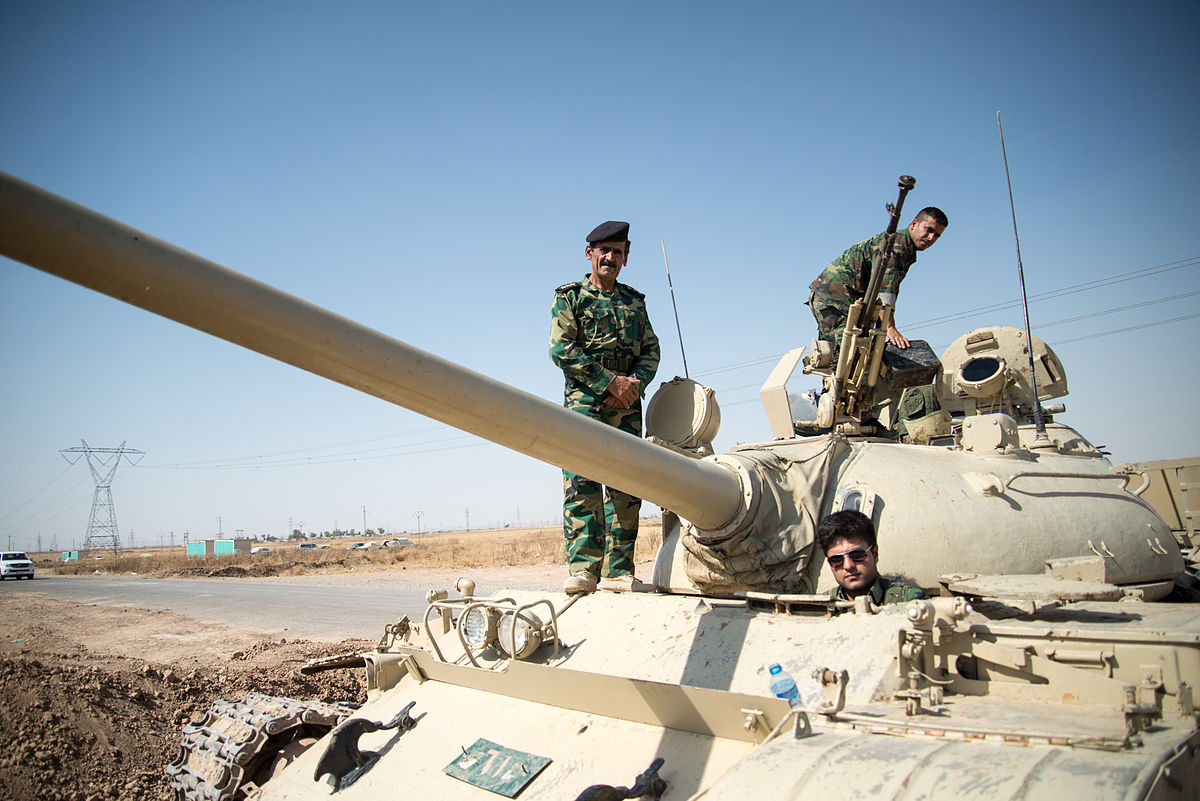
0 comments on “Peshmerga have never sold weapons from the Bundeswehr”